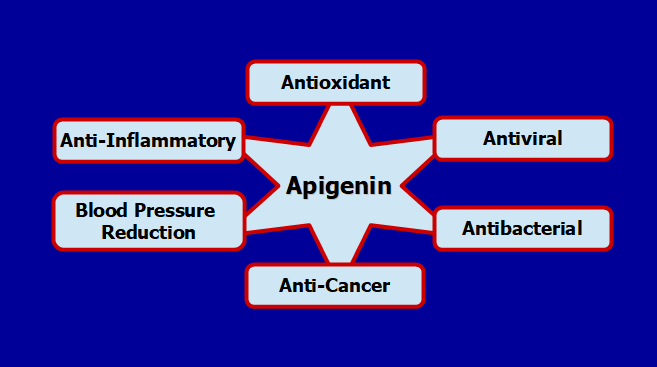This article is going to explore the question: can apigenin prevent and reverse cancer? Apigenin is a natural flavonoid found in a wide variety of fruits and vegetables. Later in this article I’ll provide you with a table to help you choose the best sourcing if your decide to incorporate this ingredient into your lifestyle.
As a cancer survivor I’m always looking for ways to reduce my risk.
Recently, I’ve had several friends either directly suffer from cancer or have family members dealing with cancer issues. In 2016 there were approximately 1.6 million new cancer cases and almost 600,000 deaths in the United States. Hopefully this information will be beneficial to the millions of people who have cancer or have family and friends who have cancer.
In the image I used for this article on can apigenin prevent and reverse cancer you can see that this natural ingredient can provide the following benefits:
-
Anti-Cancer
-
Anti-Inflammatory
-
Antibacterial
-
Antiviral
-
Antioxidant
-
Blood Pressure Reduction
That’s a significant number of benefits but for this article we’re only going to focus on the anti-cancer component.
Can Apigenin Prevent and Reverse Cancer – Details On How It Works
To get us started I’d like to provide the following quote from a 2017 study from NCBI titled Apigenin in cancer therapy: anti-cancer effects and mechanisms of action:
“Apigenin is a common dietary flavonoid that is abundantly present in many fruits, vegetables and Chinese medicinal herbs and serves multiple physiological functions, such as strong anti-inflammatory, antioxidant, antibacterial and antiviral activities and blood pressure reduction. Therefore, apigenin has been used as a traditional medicine for centuries. Recently, apigenin has been widely investigated for its anti-cancer activities and low toxicity. Apigenin was reported to suppress various human cancers in vitro and in vivo by multiple biological effects, such as triggering cell apoptosis and autophagy, inducing cell cycle arrest, suppressing cell migration and invasion, and stimulating an immune response.”
To start with apigenin is a flavonoid. Flavonoids are a large subgroup of what are called polyphenols. This specific group of polyphenols have been shown to help reduce the risk for cancer by functioning as powerful antioxidants to reduce or eliminate free radical damage.
Free radicals have been linked to DNA damage and inflammation, which helps to create the environment for cancer cells to take hold.
Programmed Cell Death or Apoptosis – Fundamental to normal healthy tissue is a process of cell death as new cells are created to replace existing cells. In cancer this programmed cell death is compromised so that cells don’t die but proliferate.
Apiginen seems to help reprogram cancer cells so that they undergo normal programmed cell death. In numerous studies apigenin has been shown to either directly induce apoptosis or to sensitize cells to other apoptotic stimuli. This programmed cell death as been shown to work in the following cancer cell lines:
-
Oral
-
Esophageal
-
Colorectal
-
Hepatic
-
Pancreatic
-
Colon
Here is a link to a 2016 article from the Journal of Cancer Prevention that provides more details on how apigenin prevents and reverses cancer:
http://www.jcpjournal.org/journal/view.html?doi=10.15430/JCP.2016.21.4.216
Autophagy – Autophagy is a process in which the lysosomes of cells are used to digest abnormal cells. This is a very complex process.
Many types of cancers can, for lack of a better word, reprogram this process of lysosomes digesting abnormal cells to actually protect cancer cells.
Apigenin has been shown in numerous cancer studies to help restore the body’s natural ability to use lysosomes to digest abnormal cells.
And as more research is being done on apigenin, scientists are finding that this natural ingredient helps to provide cellular communication to properly coordinate both autophagy with apoptosis.
Can Apigenin Prevent and Reverse Cancer – Natural Sources of Apigenin
If you decide to incorporate this natural flavonoid into your daily routine, then the following table and information will be helpful in choosing the best route to take:
|
Natural Source |
Ug/g |
Mg/g |
|
Parsley (dried) |
45035 |
45 |
|
Chamomile |
3,000 – 5,000 |
3 – 5 |
|
Parsley (fresh) |
2154 |
2.15 |
|
Celery Seed |
786 |
0.79 |
|
Chinese Celery |
240 |
0.24 |
|
Kumquats |
218 |
0.22 |
|
Celery |
191 |
0.19 |
|
Mexican Oregano |
177 |
0.18 |
|
Atichoke |
75 |
0.08 |
|
Peppermint |
54 |
0.05 |
As you can see by this table your best natural sourcing is dried parsley, chamomile, and fresh parsley.
I don’t know about you but I would find it difficult to incorporate these three natural ingredients into my daily diet. So I searched online to find a nutritional supplement that would provide a good amount of apigenin on a daily basis. I found two:
Triple Action Cruciferous Vegetable Extract from LifeExtension – This formulation contains 25 mg of apigenin as well as other ingredients. Click Here for more information on this supplement.
Apigenin from Swanson at Walmart – This formulation contains 50 mg of apigenin. Click Here for more information on this supplement.
As you can see by these two supplements apigenin can be an inexpensive way to add a powerful flavonoid to your diet. One that can help boost your body’s ability to maintain normal cellular communication to potentially reduce the risk for cancer. And maybe help make cancer treatments more effective.

Leave a Reply
You must be logged in to post a comment.